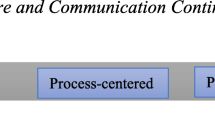Abstract
The purpose of this study was to examine the role of physicians on HEC including structural and process features. Four committees were selected from among 12 volunteering to participate with 12 sessions observed. Power analysis (0.8) confirmed an adequate number of communication exchanges, and no statistical significant difference (p < 0.05) among two prior surveys affirmed the sample. Data collection included established questionnaires and communication analyses with a tested method. Results revealed physician presence was robust and similar to prior reports on HEC structure; however, physicians rated their role effectiveness lower than other occupations and lower than overall committee effectiveness. Communication exchanges representing process revealed three positive communication types, and consistent attempts to aid committee functions through consensual processes that also were substantiated by non-physician members. Findings suggested more attention to both structural and process functions of HEC and their members.


Similar content being viewed by others
References
Alusio, M., & Arnold, R. (2008). Role of the ethics committee: Helping to address value conflicts or uncertainties. Chest, 134(2), 417–424.
Bayley, C. (2006). Ethics committee DX: Failure to thrive. HEC Forum, 18(4), 357–367.
Cartwright, L., & Zander, A. (Eds.). (1966). Group dynamics: Research and theory. London, UK: Tavistock Publishers.
Cranford, R., & Doudera, A. (Eds.). (1984). Institutional ethics committees and healthcare decision making. Ann Arbor, MI: Health Administration Press.
Csikai, E. (1983). Survey of social workers on hospital ethics committees in Pennsylvania. Doctoral Dissertation, University of Pittsburgh, Pittsburgh, PA.
DeVries, R., & Forsberg, C. (2002). Who decides? A look at ethics committee membership. HEC Forum, 14(3), 252–258.
Edlestein, L., DeRenzo, E., Waetzig, E., et al. (2009). Communication and conflict management training for clinical bioethics committees. HEC Forum, 21(4), 341–349.
Gaudine, A., Thorne, L., LeFort, S., et al. (2010). Evolution of hospital clinical ethics committees in Canada. Journal of Medical Ethics, 36(3), 132–137.
Gonsoulin, T. (2009). A survey of Louisiana hospital ethics committees. Laryngoscope, 119(2), 330–340.
Larcher, V., Slowther, A., & Watson, A. (2010). Core competencies for clinical ethics committees. Clinical Medicine, 10(1), 30–33.
Lawrence, R., & Curlin, F. (2009). Autonomy, religion and clinical decisions: Findings from a national physician survey. Journal of Medical Ethics, 35(4), 214–218.
McDaniel, C. (1998). Hospital ethics committees and nurses’ participation. The Journal of Nursing Administration, 28(9), 47–51.
McDaniel, C. (1999). Clergy contributions to healthcare ethics committees. HEC Forum, 11(2), 140–154.
McDaniel, C., Roche, J., & Veledar, E. (2010). Ethics environment in long-term care. Journal of Applied Gerontology. doi:10.1177/0733464810361464.
McDaniel, C., Veledar, E., LaConte, S., et al. (2006). Ethics environment, healthcare work, and patient outcomes. The American Journal of Bioethics, 6(5), W17–W29.
Milmore, D. (2006). Hospital ethics committees: A survey in Upstate New York. HEC Forum, 18(3), 222–244.
Moreno, J. (2006). Ethics committees: Beyond benign neglect. HEC Forum, 18(4), 368–369.
Ricci, G., & Cannovo, N. (2009). The importance of the training of ethics committee members. Medicine and Law, 28(4), 649–659.
Ross, J. (2000). Changing the HEC mission. HEC Forum, 12(1), 4–7.
Roter, D. (1991). The Roter interaction analysis system. Baltimore, MD: Johns Hopkins School Public Health.
Scheirton, L. (1992). Determinants of hospital ethics committee success. HEC Forum, 4(6), 342–359.
Schick, I., & Guo, L. (2001). Ethics committees identify success factors: A national survey. HEC Forum, 13(4), 344–360.
Whitehead, J., Sokol, D., Bowman, D., et al. (2009). Consultation activities of clinical ethics committees in the United Kingdom: An empirical study and wake-up call. Postgraduate Medical Journal, 85(1007), 449–450.
Williamson, L., McLean, S., & Connell, J. (2007). Clinical ethics committees in the United Kingdom: Towards evaluation. Medical Law International, 8(3), 221–238.
Youngner, S., Jackson, D., Coulton, C., et al. (1983). A national survey of hospital ethics committees. Critical Care Medicine, 11, 902–905.
Acknowledgments
The author/researcher acknowledges that no payments, actual or in-kind, were received for this study. Appreciation is extended to the many participants for their generous time and effort.
Author information
Authors and Affiliations
Corresponding author
Rights and permissions
About this article
Cite this article
McDaniel, C. Assessing Physicians’ Roles on Health Care Ethics Committees. HEC Forum 22, 275–286 (2010). https://doi.org/10.1007/s10730-010-9142-5
Published:
Issue Date:
DOI: https://doi.org/10.1007/s10730-010-9142-5




